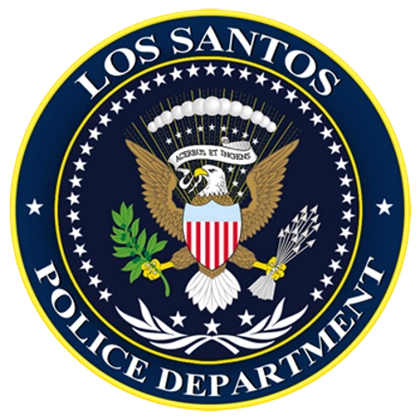Command Structure
Career Ladder and Responsibilities
The LSPD follows two types of advancement programs. The first is through promotions, and the second is through special assignments.

POLICE CADET
The first step in the career ladder with the Los Santos Police Department is Police Cadet. It is the entry-level classification given to all LSPD officers upon entering the police academy. For a duration of time in the academy and on-field training, officers are taught criminal law, human relations, and report writing.
In addition, they are trained in tactics, firearms, and driving. Physical fitness and self-defense play a big part in Academy training. A Police Cadet will advance to Probationary Officer upon successful completion of his/her training period with Training Officers.

PROBATIONARY OFFICER
After graduating from the training phase, a Probationary Officer is assigned to a patrol duties within the City of Los Santos where they must utilize all the knowledge and tactics learned during the training period.
Probationary Officers are cleared for solo patrol and conduct duties as would a regular officer.

OFFICER
After graduating from the probationary phase, an Officer is granted the privilege of participating in certifications and divisions.
An Officer has demonstrated the compentency and dedicated to their department.

SENIOR OFFICER
A tenured officer. Senior Officers are experienced officers with more seniority than their Officer counterpart.
Senior Officer is a preparatory position that allows officers to demonstrate leadership capabilities. Senior Officer is a stepping stone to the role of a Supervisor.
The backbone of the Police Department.

CORPORAL
Corporals are the supervisors of the department. As an entry-level command position, this role serves as the primary position for monitoring and assisting officers on patrol.
Corporals are the first line of the Chain of Command, answering questions patrol officers may have, as well as escalating issues up the command structure that they cannot handle.
Corporals are also the first ranks within the Command Structure to start leading certifications and divisions.
Corporal is a rank given to officers who have shown compentency is leading scenes, commanding officers, and an overall prowess in leadership.
RESPONSIBILITIES
- Oversee and supervise patrol units.
- Aid with leading situations and scenes when necessary.
- Answer general questions and concerns of patrol officers.
- Issue reprimands and strikes to officers.
- Report directly to Sergeant for escalating issues.
The Command team is split into two categories: Command and High Command.

SERGEANT
Sergeants are the primary member of command that aid in patrols and supervise entire shifts.
Much like a department manager, a Sergeant supervises a squad or detail of Police Officers and/or civilian employees. A Sergeant is required to provide instruction to assigned staff in the operation of their required duties.
The basic capacity of a Sergeant is field supervision, but administrative and specialized assignments are also available. Some Sergeants perform initial and follow-up investigation of crimes and perform surveillance work to detect or prevent crime.
RESPONSIBILITIES
- Watch Commander, oversees all patrol units on duty.
- Ensure cadets are matched with FTO's and complying with protocol.
- Issue reprimands and strikes.
- Monitor and take control of scenes and situations when necessary.
- Host the daily briefing.
- Send officers off-duty for violation of protocol or procedures.
- Lead divisions and certifications.
- Report directly to Lieutenants, and the Lieutenant of Specialized Divisions if leading a specialization.

LIEUTENANT
After serving as a Sergeant, you are eligible to promote to the next classification on the ladder upon demonstration of excellent leadership and excelling at your responsibilites. Similar to a Second Level Manager for a large corporation, a Lieutenant manages, plans, organizes, and directs the work officers.
RESPONSIBILITIES
A promotion to Lieutenant will introduce additional administrative duties.
- Handle the hiring and firing of officers.
- Promote officers up to Corporal.
- Issue reprimands and strikes up to Sergeant.
- Overwatch certifications.
- Veto reprimands issued by Sergeants.
- Schedule and host academies.
- Report directly to Captains.

CAPTAIN
Upon promotion from Lieutenant, you advance to Captain. You must show extensive ability for leadership, as well as compentency of department protocols and procedures.
Captains are responsible for inspecting and overseeing the functions of the patrol officers to ensure compliance with the department policies, procedures, regulations, and standards.
RESPONSIBILITIES
A promotion to Captain will introduce additional administrative duties.
- The hiring and firing of officers.
- Promotions up to Lieutenant.
- Issue reprimands and strikes up to Lieutenant.
- Veto punishments issued up to Lieutenant.
- Handle transfer requests between agencies.
- Oversee general police department day-to-day.
- Assist HC with matters that should not escalate to them.
- Assist with handling cases brought by the DOJ.
